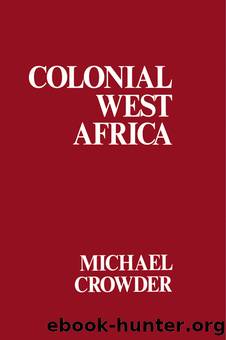Colonial West Africa by Michael Crowder

Author:Michael Crowder [Crowder, Michael]
Language: eng
Format: epub
Tags: History, General
ISBN: 9781135781392
Google: Vel2HS7pr4sC
Publisher: Routledge
Published: 2013-01-11T15:55:05+00:00
CONCLUSION
The imposition of the Native Authority system of local government on the non-Muslim chieftaincy of Bussa, and in particular the manner in which it was imposed, provoked a sharp reaction on the part of the traditional elite and the people. The fact that no revolt took place earlier can be attributed to two factors. First, resistance to colonial occupation had been very firmly put down by the French, who occupied much of what became British Borgu.(99) Second, the first ten years of British administration in Borgu, and in Bussa in particular, was very light in touch, and limited largely to keeping the peace, ensuring freedom of person and movement, and exacting tribute on a small-scale to indicate the new relationship of dependence in which the native âauthoritiesâ found themselves. With such minimal goals, the British in Bussa, and in Northern Nigeria generally, used the pre-colonial authorities wherever they would co-operate rather than disturb the traditional status quo. In Bussa, Kitoro Gani proved more than willing to co-operate: the problem was that from the British point of view, even as far as achieving their limited goals in Bussa were concerned, he was ineffective. The options open to the British in such circumstances were to identify an alternative traditionally acceptable authority, as was done in Sokoto, or identify a man of ability without traditional claim to power but whom the people would at least passively accept, as was the case in Katsina. The key task of the local British administration in such situations was (a) to identify which course was the better to take in the circumstances and (b) having decided on the course to be adopted, identify the right man to appoint to the chieftaincy. In Bussa, both Clarke, the District Officer, and Hamilton-Browne were guilty of gross ineptitude because they signally failed to prescribe the correct remedy to the problem. Rather the remedy was, as we can see with the value of hindsight, almost calculated to provoke the armed protest which it was their duty at all costs to avoid because their reorganisation of ânative authorityâ in Bussa altered the relative position of politically and socially consequential persons in Bussa to an extent that was intolerable to those disinherited as a result of it.(100)
While, however, once the revolt had been put down, the British were prepared to undertake reforms in an attempt to settle the grievances â both expressed and unexpressed â of the traditional elite and people, in particular by restoring the position of the traditional elite as it existed prior to the rebellion, they did nothing to alter the fundamental structure of the Native Authority system which they had imposed on Bussa. The slave District Head may have been replaced by the Emir Kijibrim and he in turn by the restored Kitoro Gani and Yauriâs suzerainty over Bussa dispensed with. But both Kijibrim and Kitoro Gani were required to rule as Native Authorities on the same lines as the Emirs of the Fulani-Hausa Emirates to the north. The
Download
This site does not store any files on its server. We only index and link to content provided by other sites. Please contact the content providers to delete copyright contents if any and email us, we'll remove relevant links or contents immediately.
Man-made Catastrophes and Risk Information Concealment by Dmitry Chernov & Didier Sornette(6019)
The Revenge of Geography: What the Map Tells Us About Coming Conflicts and the Battle Against Fate by Kaplan Robert D(4077)
Zero Waste Home by Bea Johnson(3839)
COSMOS by Carl Sagan(3625)
Good by S. Walden(3559)
In a Sunburned Country by Bill Bryson(3542)
The Fate of Rome: Climate, Disease, and the End of an Empire (The Princeton History of the Ancient World) by Kyle Harper(3067)
A Wilder Time by William E. Glassley(2863)
Camino Island by John Grisham(2798)
Organic Mushroom Farming and Mycoremediation by Tradd Cotter(2692)
The Ogre by Doug Scott(2683)
Human Dynamics Research in Smart and Connected Communities by Shih-Lung Shaw & Daniel Sui(2501)
Energy Myths and Realities by Vaclav Smil(2493)
The Traveler's Gift by Andy Andrews(2461)
9781803241661-PYTHON FOR ARCGIS PRO by Unknown(2372)
Inside the Middle East by Avi Melamed(2357)
Birds of New Guinea by Pratt Thane K.; Beehler Bruce M.; Anderton John C(2255)
A History of Warfare by John Keegan(2244)
And the Band Played On by Randy Shilts(2210)
